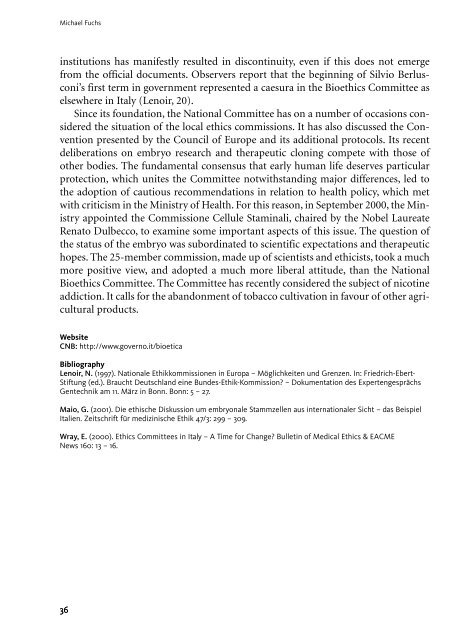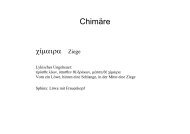Michael Fuchs National ethics councils - Deutscher Ethikrat
Michael Fuchs National ethics councils - Deutscher Ethikrat
Michael Fuchs National ethics councils - Deutscher Ethikrat
Create successful ePaper yourself
Turn your PDF publications into a flip-book with our unique Google optimized e-Paper software.
<strong>Michael</strong> <strong>Fuchs</strong> <strong>National</strong> <strong>ethics</strong> <strong>councils</strong>. Their backgrounds, functions and modes of operation compared<br />
institutions has manifestly resulted in discontinuity, even if this does not emerge<br />
from the official documents. Observers report that the beginning of Silvio Berlusconi’s<br />
first term in government represented a caesura in the Bio<strong>ethics</strong> Committee as<br />
elsewhere in Italy (Lenoir, 20).<br />
Since its foundation, the <strong>National</strong> Committee has on a number of occasions considered<br />
the situation of the local <strong>ethics</strong> commissions. It has also discussed the Convention<br />
presented by the Council of Europe and its additional protocols. Its recent<br />
deliberations on embryo research and therapeutic cloning compete with those of<br />
other bodies. The fundamental consensus that early human life deserves particular<br />
protection, which unites the Committee notwithstanding major differences, led to<br />
the adoption of cautious recommendations in relation to health policy, which met<br />
with criticism in the Ministry of Health. For this reason, in September 2000, the Ministry<br />
appointed the Commissione Cellule Staminali, chaired by the Nobel Laureate<br />
Renato Dulbecco, to examine some important aspects of this issue. The question of<br />
the status of the embryo was subordinated to scientific expectations and therapeutic<br />
hopes. The 25-member commission, made up of scientists and ethicists, took a much<br />
more positive view, and adopted a much more liberal attitude, than the <strong>National</strong><br />
Bio<strong>ethics</strong> Committee. The Committee has recently considered the subject of nicotine<br />
addiction. It calls for the abandonment of tobacco cultivation in favour of other agricultural<br />
products.<br />
Website<br />
CNB: http://www.governo.it/bioetica<br />
Bibliography<br />
Lenoir, N. (1997). <strong>National</strong>e Ethikkommissionen in Europa – Möglichkeiten und Grenzen. In: Friedrich-Ebert-<br />
Stiftung (ed.). Braucht Deutschland eine Bundes-Ethik-Kommission? – Dokumentation des Expertengesprächs<br />
Gentechnik am 11. März in Bonn. Bonn: 5 – 27.<br />
Maio, G. (2001). Die ethische Diskussion um embryonale Stammzellen aus internationaler Sicht – das Beispiel<br />
Italien. Zeitschrift für medizinische Ethik 47/3: 299 – 309.<br />
Wray, E. (2000). Ethics Committees in Italy – A Time for Change? Bulletin of Medical Ethics & EACME<br />
News 160: 13 – 16.<br />
36<br />
Portugal<br />
The Conselho Nacional de Etica para as Ciências da Vida (CNECV) was established<br />
by a law of 9 June 1990. Although an independent body, it is linked to the office of<br />
the President of the Council of Ministers. Its function is systematic analysis of the<br />
moral problems posed by scientific progress in the field of biology, medicine and<br />
general healthcare. It is required to furnish an annual report to the President of the<br />
Council of Ministers on the status of new technologies and their application to human<br />
subjects, as well as the associated ethical and social problems, and to draw up<br />
recommendations on these problems.<br />
The Council’s President is appointed by the President of Council of Ministers. Article<br />
3 of the Law provides that the Council shall have another 20 members, of whom<br />
seven must be distinguished in the humanities and social sciences and have shown<br />
particular interest in ethical problems, while seven others must be experienced in<br />
medicine or biology, including the ethical implications of these disciplines. Finally,<br />
six members representing the principal faiths and ethical philosophies are appointed<br />
by the <strong>National</strong> Assembly. Of the seven representatives of the humanities, four are appointed<br />
by Ministers (of Planning, Justice, Education and Youth) and the others by<br />
the Conference of University Rectors, the Law Society and the Council for Women’s<br />
Issues. Responsibility for appointing the medical experts and biologists rests with the<br />
Minister of Health, the Conference of University Rectors, the Academy of Sciences,<br />
the Medical Association, the <strong>National</strong> Institute of Scientific Research, the <strong>National</strong><br />
Commission on Scientific and Technological Research and the Higher Council on<br />
Forensic Medicine. As in France, the Council appoints a ten-member coordinating<br />
committee from among its members and may establish working parties.<br />
The right of referral is not confined to the institutions of state but extends far beyond<br />
them. Article 11 of the founding law already provides for regular conferences to<br />
ensure ongoing dialogue with the public. Even so, the Council itself admits to difficulties<br />
precisely in communication with the media, at least in the initial phase. The<br />
Council is dependent for administrative and financial resources on the Office of the<br />
President of the Council of Ministers, to which it is institutionally subordinated and<br />
whose premises it shares. The Law provides for the establishment of a documentation<br />
centre to support the Council in its work. However, the centre is appreciably<br />
smaller than its counterpart in Paris at INSERM.<br />
Over the last 13 years, the Council has compiled reports and adopted positions on<br />
almost all issues of biomedical <strong>ethics</strong>. It meets once a month in plenary session, and<br />
a number of working parties also hold meetings. The Council is in addition free to<br />
comment on issues that are already regulated by law. For this reason, it also considers<br />
itself responsible for monitoring ethical standards (<strong>National</strong> Council, 8). Despite<br />
the relatively small scale of biomedical research in Portugal, the CNECV has issued a<br />
37




